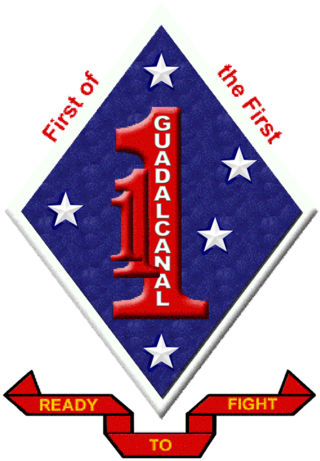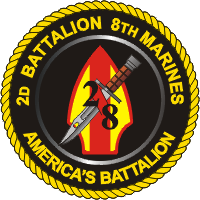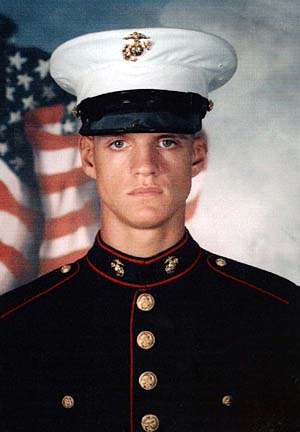
The Second Battle of Fallujah, initially codenamed Operation Phantom Fury, Operation al-Fajr was an American-led offensive of the Iraq War that lasted roughly six weeks, starting 7 November 2004. Marking the highest point of the conflict against the Iraqi insurgency, it was a joint military effort carried out by the United States, the Iraqi Interim Government, and the United Kingdom. Within the city of Fallujah, the coalition was led by the U.S. Marine Corps and U.S. Army, the battle was later described as "some of the heaviest urban combat Marines have been involved in since Huế City in Vietnam in 1968" and as the toughest battle the U.S. military has been in since the end of the Vietnam War. It was the single bloodiest and fiercest battle of the entire conflict, including for American troops.

2d Battalion 5th Marines is an infantry battalion in the United States Marine Corps consisting of approximately 800 marines and sailors. They are based out of Marine Corps Base Camp Pendleton, California and fall under the command of the 5th Marine Regiment and the 1st Marine Division. The battalion has seen combat in World War I, World War II, the Korean War, the Vietnam War and the Gulf War and has deployed many times in support of Operation Iraqi Freedom and the War on Terror.

1st Battalion, 1st Marines (1/1) is an infantry battalion in the United States Marine Corps based out of Camp Pendleton, California, consisting of anywhere from 800 to 2,000 Marines and Sailors, but the number fluctuates depending on the battalion's mission. Falling under the command of the 1st Marine Regiment and the 1st Marine Division, they are commonly referred to as "The first of the First".

3rd Battalion, 4th Marines (3/4) or (V34) is an infantry battalion of the United States Marine Corps. Nicknamed "Thundering Third" and "Darkside," it is based at the Marine Corps Air Ground Combat Center, Twentynine Palms, California, and consist of approximately 1,000 Marines. The unit currently falls under the command of the 7th Marine Regiment, 1st Marine Division, but — along with its two sister battalions — is hosted by the 3rd Marine Division, at Camp Schwab in Okinawa, Japan, when training in jungle warfare. The 3rd falls under the 4th Marine Regiment at such times.

2nd Battalion, 11th Marines (2/11) is an artillery battalion comprising four firing batteries and a Headquarters Battery. The battalion is stationed at Marine Corps Base Camp Pendleton, California. Its primary weapon system is the M777 lightweight howitzer. The battalion was the first in the Marine Corps to fully transition from the M198 Howitzer. They fall under the command of the 11th Marine Regiment and the 1st Marine Division.

2nd Battalion, 8th Marines (2/8) is an infantry battalion in the United States Marine Corps based in Marine Corps Base Camp Lejeune, North Carolina consisting of approximately 900 marines and sailors. Nicknamed "America's Battalion," they fall under the 8th Marine Regiment and the 2nd Marine Division.

Jason Lee Dunham was a corporal in the United States Marine Corps who was posthumously awarded the Medal of Honor for his actions while serving with 3rd Battalion 7th Marines during the Iraq War. While on a patrol in Husaybah, his unit was attacked and he deliberately covered an enemy grenade to save nearby Marines. When it exploded Dunham was gravely injured and died eight days later.

3rd Battalion, 24th Marines (3/24) was a reserve infantry battalion in the United States Marine Corps. The battalion was first formed in 1943 for service in the Pacific Theater of Operations during World War II, taking part in a number of significant battles including those at Saipan and Iwo Jima before being deactivated at the end of the war. In the early 1960s, the unit was reactivated as a reserve battalion. It was located throughout the Midwestern United States and consisted of approximately 800 marines and sailors. The battalion was part of the 24th Marine Regiment and the 4th Marine Division. Recent operations included tours in Iraq and Afghanistan. On May 19, 2013, the battalion was deactivated (retired) as a part of 2013 Marine Corps Force Restructuring, along with the 24th Marine Regiment. 3/24 personnel were reallocated to 23rd Marine Regiment, with the majority of the companies becoming 3rd Battalion, 23rd Marines.

2nd Assault Amphibian Battalion is a mechanized battalion of the United States Marine Corps. Their primary weapon system is the Amphibious Assault Vehicle. The battalion is a separate battalion within the 2nd Marine Division and the II Marine Expeditionary Force. The unit is based out of the Camp Lejeune, North Carolina

The Battle of Ramadi was fought in the spring of 2004, during the same time as the First Battle of Fallujah, for control of the capital of the Al Anbar Governorate in western Iraq. A coalition military force consisting of the 2nd Battalion, 4th Marines were stationed to defend the city from an insurgent assault.

The Battle of Ramadi was fought during the Iraq War from March 2006 to November 2006, for control of the capital of the Al Anbar Governorate in western Iraq. A joint US military force under the command 1st Brigade Combat Team, 1st Armored Division and Iraqi Security Forces fought insurgents for control of key locations in Ramadi. Coalition strategy relied on establishing a number of patrol bases called Combat Operation Posts throughout the city.

The 2004 Iraq spring fighting was a series of operational offensives and various major engagements during the Iraq War. It was a turning point in the war; the Spring Fighting marked the entrance into the conflict of militias and religiously based militant Iraqi groups, such as the Shi'a Mahdi Army.
The Battle of Husaybah was fought in the spring of 2004 at the same time as the First Battle of Fallujah. In April 2004, Fallujah was under siege by United States Marines, and insurgents were looking to relieve pressure on the city by attempting an offensive of their own. Ten days before, the highway connecting Al Anbar to Baghdad was cut and the insurgents attacked the capital of the province, Ramadi. The attack was repulsed by the Marines and the battle resulted in heavy casualties on both sides. Now the insurgents were ready for another attack which would serve as third location attacked in a simultaneous assault against U.S. forces, on the city of Husaybah on the Syrian border. Infantry elements of 3rd Battalion, 7th Marine Regiment Lima Company, 2 platoons from India Company, 2 platoons from Kilo Company and CAAT White, were deployed to Husaybah to counter the enemy offensive.
Al-Karmah, also sometimes transliterated as Karma, Karmah, or Garma, is a city in central Iraq, 16 km (10 mi) northeast of Fallujah in the province of Al Anbar.
The Battle of Donkey Island was a skirmish that occurred on 30 June and 1 July 2007 between elements of the U.S. Army Task Force 1-77 Armor Regiment, the 2nd Battalion 5th Marines and a numerically superior force of al-Qaeda in Iraq insurgents on the banks of a canal leading from Ramadi to Lake Habbaniyah in the Al-Anbar province of Iraq.

Combat Logistics Battalion 6 (CLB-6) is a logistics battalion of the United States Marine Corps. Nicknamed "Red Cloud," the unit is based at Marine Corps Base Camp Lejeune, North Carolina and fall under the command of Combat Logistics Regiment 2 and the 2nd Marine Logistics Group..

The Anbar campaign consisted of fighting between the United States military, together with Iraqi security forces, and Sunni insurgents in the western Iraqi governorate of Al Anbar. The Iraq War lasted from 2003 to 2011, but the majority of the fighting and counterinsurgency campaign in Anbar took place between April 2004 and September 2007. Although the fighting initially featured heavy urban warfare primarily between insurgents and U.S. Marines, insurgents in later years focused on ambushing the American and Iraqi security forces with improvised explosive devices (IEDs), large scale attacks on combat outposts, and car bombings. Almost 9,000 Iraqis and 1,335 Americans were killed in the campaign, many in the Euphrates River Valley and the Sunni Triangle around the cities of Fallujah and Ramadi.
Operation Murfreesboro was one of the closing engagements of the Battle of Ramadi during the Iraq War and resulted in a decisive victory for the United States Forces over the Islamic State of Iraq. It is widely credited with breaking the back of the insurgency in Anbar Province, resulting in the Anbar province favoring the new Iraqi government in Baghdad.

Operation Sayeed also known as Operation Hunter in English, was a series of operations conducted in western Al Anbar Governorate by the United States Marine Corps in 2005. It was an umbrella operation, consisting of at least 11 named operations between July 2005 to December 2005. The purpose was to drive Al-Qaeda in Iraq forces from the Western Euphrates River Valley. Some parts of Operation Sayeed were Operation Steel Curtain and Operation Iron Fist.

Ramadi, the capital of Iraq's Al Anbar Governorate, was under U.S. military occupation during the Iraq War. It was a focal point of Iraqi insurgency, which erupted into open armed conflict in 2004 and in 2006, part of the Iraq War in Anbar Province. Operation Murfreesboro was a U.S. offensive in February 2007 intended to cut off the Ma'Laab district of eastern Ramadi from the rest of the town in order to drive out Zarqawi's Al-Qaeda in Iraq.













